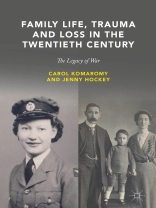This book uses personal memoir to examine links between private trauma and the socio-cultural approach to death and memory developed within Death Studies. The authors, two key Death Studies scholars, tell the stories that constitute their family lives. Each bears witness to the experiences of men who were either killed or traumatised during World War One and World War Two and shows the ongoing implications of these events for those left behind. The book illustrates how the rich oral history and material culture legacy bequeathed by these wars raises issues for everyone alive today. Belonging to a generation who grew up in the shadow of war, Komaromy and Hockey ask how we can best convey unimaginable events to later generations, and what practical, moral and ethical demands this brings.
Family Life, Trauma and Loss in the Twentieth Century will be of interest to students and scholars across a range of disciplines including Death Studies, Military History, Research Methods, Family History, the Sociology of the Family and Life Writing.
Содержание
1 Recovery, Retrieval and Healing .-2 Missing Persons .-3 Changing Perspectives on Death, Dying and Loss .-4 World War One and its Transformations .-5 Family Life Between the Wars: 1918–1931
6 War in Prospect, 1930–1939.-7 At Home and Abroad .-8 Experiencing the Horror of World War Two
9 Growing Up Post-War: All Over Now?.-10 Endings and Beginnings
Об авторе
Carol Komaromy is Visiting Research Fellow at The Open University, UK, where she has worked since 1994.
Jenny Hockey is Emeritus Professor of Sociology at the University of Sheffield, UK.












